 Peloton Interactive (NASDAQ: PTON), a high-end fitness products company, is a relatively recent addition to our Battle Road IPO Review Consumer sector coverage. Founded in 2012 and based in New York City, Peloton is expected to record revenue of $1.48 billion in its fiscal year ending June 30th 2020, along with a loss per share of $1.29. This compares to revenue of $915 million in fiscal year 2019, during which the company recorded an operating loss of $113 million, excluding depreciation expense.
Peloton Interactive (NASDAQ: PTON), a high-end fitness products company, is a relatively recent addition to our Battle Road IPO Review Consumer sector coverage. Founded in 2012 and based in New York City, Peloton is expected to record revenue of $1.48 billion in its fiscal year ending June 30th 2020, along with a loss per share of $1.29. This compares to revenue of $915 million in fiscal year 2019, during which the company recorded an operating loss of $113 million, excluding depreciation expense.
Peloton announced the pricing of its 40 million Class A share IPO on September 25th. The deal was priced at $29 per share, and was led by a remarkably large number of underwriters—21 in total—reflecting in part the recent IPO drought. Peloton also announced the concurrent sale of 3.5 million additional shares of its Class A common stock in a private placement to entities affiliated with TCV, an existing shareholder. Following the IPO, roughly 45 million Class A and 236 million Class B common shares outstanding for a total of 281 million shares outstanding, with Class B shares holding 99 percent of the voting power. At a recent share price of $28, Peloton Interactive possesses a market cap of roughly $7.9 billion.
Peloton Interactive positions itself as an interactive fitness platform at the “nexus of fitness, technology and media,” which creates, in its own words, “engaging to the point of addictive” programming for customers. PTON is primarily a high-end exercise bike and treadmill company, with approximately 69 percent of sales coming from connected products, with most of the remaining 31 percent from subscriptions associated with its product sales. Over the last five years, the company has sold over 580,000 exercise bike and treadmills, with about 97 percent of the total sold in the U.S. Roughly 50 percent of revenue comes from sales from its website onepeloton.com. Other channels include showrooms. The company claims over 1.4 million member subscribers, who completed over 58 million workouts in fiscal 2019.
To peruse Peloton’s product offerings on its company website is to realize just how strong today’s consumer economy has become. Pricing for Peloton’s exercise bike begins at $2,245, with a one year limited warranty, and pricing for its tread machine begins at $4,245, with a one year limited warranty. In the most recent quarter ended September 30th, Peloton reported revenue of $228 million, a 104 percent increase over the prior year, along with a gross margin of 46 percent, flat with the prior year. The company’s operating loss was $51 million, as compared to an operating loss of $56 million in the prior year. Post-IPO Peloton has a strong balance sheet, with roughly $1.5 billion in cash, or $5.25 in cash per share, and no debt, though we do note that the company is currently not profitable.
Tags: IPO Research, independent research on IPOs, independent stock research; independent research on Peloton Interactive, independent research on Consumer stocks; independent research on Consumer IPOs.






 .
.